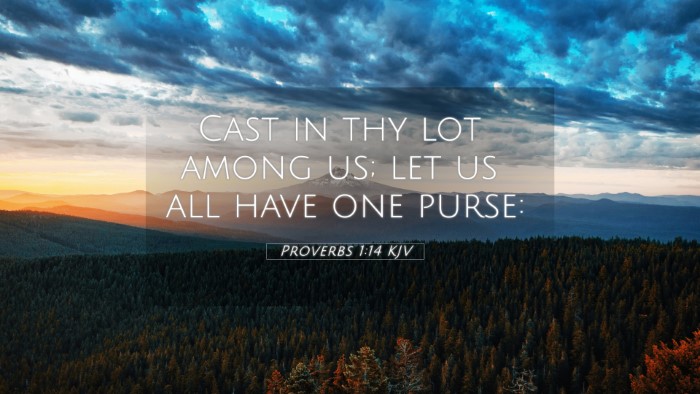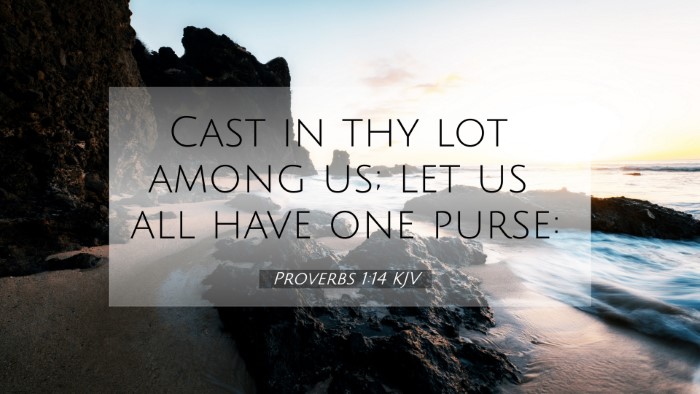Understanding Proverbs 1:14
Proverbs 1:14 states, "Cast in thy lot among us; let us all have one purse." This verse reflects the invitation from the wicked to join in their schemes of gain through dishonest means. In examining this verse, we can gather insights from various public domain commentaries, harmonizing their interpretations to provide a clearer understanding.
Interpretative Summary
This verse is indicative of the lure of companionship in wrongdoing, emphasizing a collaborative approach to unethical gain. Here, the "lot" symbolizes a share in sinful activities, suggesting both a physical and moral entanglement with those who seek to profit unlawfully.
Commentary Insights
- Matthew Henry: Henry discusses how this call to unite in deceit presents a significant moral challenge. He indicates that aligning oneself with those who engage in wrongdoing can lead to one's downfall.
- Albert Barnes: Barnes highlights the potential consequences of yielding to such temptations, warning that acceptance of this invitation compromises one’s integrity and values.
- Adam Clarke: Clarke elaborates on the metaphor of the "purse," signifying shared resources that are garnered through wrongful acts. He underscores the danger of being pulled into communal sin.
Bible Verse Cross-References
To fully appreciate the themes within Proverbs 1:14, it is essential to consider several cross-references that enhance its understanding:
- Proverbs 1:10: "My son, if sinners entice thee, consent thou not." This reinforces the admonition against succumbing to the allure of sinful partnerships.
- Proverbs 4:14-15: "Enter not into the path of the wicked, and go not in the way of evil men." This warning echoes the dangers of engaging in wrongful alliances.
- 2 Corinthians 6:14: "Be ye not unequally yoked together with unbelievers." This New Testament counterpart highlights the risks of spiritual compromise in relationships.
- Psalms 26:4: "I have not sat with vain persons, neither will I go in with dissemblers." A parallel sentiment about choosing one's companions wisely.
- 1 Timothy 5:22: "Lay hands suddenly on no man, neither be partaker of other men’s sins." This serves as a caution against co-opting into wrongdoing.
- James 1:15: "Then when lust hath conceived, it bringeth forth sin." The progression from temptation to sin is evident here, similar to the enticement seen in Proverbs 1:14.
- Proverbs 29:24: "Whosoever is partner with a thief hateth his own soul." This highlights the intrinsic dangers of associating with wrongful actions.
Connections Between Bible Verses
In studying Proverbs 1:14 and its cross-references, we explore the broader theme of caution against wicked influences throughout the Bible. The connections between these verses demonstrate a consistent scriptural ethos regarding righteousness, integrity, and the risks associated with immoral companionships.
Tools for Bible Cross-Referencing
For those interested in studying cross-references, several tools and methodologies can enhance understanding:
- Bible Concordance: A helpful resource for tracing themes and connecting verses across the Scriptures.
- Bible Cross-Reference Guide: A structured approach to locate verses that relate to specific themes or ideas, such as those in Proverbs.
- Cross-Reference Bible Study: Engaging in studies that utilize cross-referenced texts to draw deeper insights.
Conclusion
Proverbs 1:14 serves as a poignant reminder of the perils associated with joining the wicked. By critically analyzing this verse alongside its associated scriptures, we gain a deeper appreciation and understanding of the call to integrity and caution in our interactions. The thematic connections across the Bible encourage us to pursue righteous paths while avoiding the allure of collective wrongdoing.


